Archives
Elisabete Martins
The latest issue of Papers in Regional Science are available! Volume 101, Issue 4, August 2022
|
Papers in Regional Science Pages: 769-1048 August 2022 |
ISSUE INFORMATION
![]() Free Access
Free Access
Pages: 769-770 | First Published: 23 August 2022
FULL ARTICLES
![]() Open Access
Open Access
The role of regions in global value chains: an analysis for the European Union
Lucía Bolea, Rosa Duarte, Geoffrey J. D. Hewings, Sofía Jiménez, Julio Sánchez-Chóliz
Pages: 771-794 | First Published: 07 April 2022
![]() Open Access
Open Access
Oluwafisayo Alabi, Karen Turner, Julia Race, Antonios Katris
Pages: 795-809 | First Published: 15 June 2022
![]() Open Access
Open Access
Regional economic effects of the Ring Road project in the Greater Tokyo Area: A spatial CGE approach
Tomoki Ishikura, Fuga Yokoyama
Pages: 811-837 | First Published: 18 April 2022
Manufacturing location patterns in Brazil
Edilberto Tiago de Almeida, Raul da Mota Silveira Neto, Roberta de Moraes Rocha
Pages: 839-873 | First Published: 11 April 2022
![]() Open Access
Open Access
Margherita Russo, Annalisa Caloffi, Ana Colovic, Pasquale Pavone, Saverio Romeo, Federica Rossi
Pages: 875-900 | First Published: 13 May 2022
![]() Open Access
Open Access
Internal migration and earnings: Do migrant entrepreneurs and migrant employees differ?
Bach Nguyen
Pages: 901-944 | First Published: 23 August 2022
![]() Open Access
Open Access
The beaten paths effect on patient inter‐regional mobility: An application to the Italian NHS
Paolo Berta, Gianmaria Martini, Daniele Spinelli, Giorgio Vittadini
Pages: 945-977 | First Published: 03 May 2022
![]() Open Access
Open Access
World City Innovation and Service Networks and Economic Growth
René Belderbos, Florence Benoit, Ben Derudder
Pages: 979-999 | First Published: 13 June 2022
Fugang Gao, Huub Ploegmakers, Erwin van der Krabben, Xiaoping Shi
Pages: 1001-1025 | First Published: 16 May 2022
Xiaotong Li, Ying Li, Jinlan Ni, Jia Yuan
Pages: 1027-1046 | First Published: 08 April 2022
BOOK REVIEW
The regional economics of technological transformations: Industry 4.0 and servitisation in European regions, By Roberta Capello and Camilla Lenzi, Routledge, London. 2021. 326 pp. ISBN 978–0–36‐767,824‐1, DOI: https://doi.org/10.4324/9781003132998
Lisa De Propris
Pages: 1047-1048 | First Published: 08 April 2022
RSPP Call for Papers | Special Issue on Covid-19 and Cities: Is it merely a short-term crisis or has it changed our cities forever?
Call for papers for RSPP Special Issue on
“Covid-19 and Cities: Is it merely a short-term crisis or has it changed our cities forever?”.
The aim of Regional Science Policy & Practice - RSPP is to promote and diffuse the understanding of human interaction in space; based on sound, rigorous and up-to-date methodologies; and focusing on real and urgent issues for peoples and places, that require adequate policy responses.
Covid-19 started off as a small local epidemic in early 2020 but became so widespread globally that the WHO declared it as a pandemic in March 2020. Covid-19 spreads fast with increased density of people, so understandably cities have been the most affected due to the crisis everywhere. While a lot of research is ongoing on various effects of the pandemic, what is less addressed is the fact whether the effects of Covid-19 are short run or long lasting. For instance, Covid-19 led to lockdowns in many cities of the world including Mumbai, Delhi, Manila, Shanghai, Sydney. In April 2020, a Barclays report estimated that “the absolute economic loss was likely the largest from the shutdown of Kuala Lumpur, Manila, Delhi and Mumbai, ranging from $1 billion-$1.7 billion per week.”
It is not just the economy of these cities that have been adversely impacted, but also livelihood and food security for many migrants in these cities. In some cities, migrants lost their jobs and were food starved. They had no means of transport, so they walked to their hometowns. In contrast, reports are that housing became more affordable during the pandemic in the central parts of cities as it reduced the need for accessing employment there. But Covid-19 may also have led to significant suburbanization and sprawl as many working populations moved to cheaper locations while keeping their jobs in the central part of cities. There is some evidence that Covid-19 led to work from home (WFH) and work from anywhere (WFA) for the skilled labour force, but the unskilled were the ones to be the worst affected as their jobs (cooking, driving, domestic help, construction, and so on) cannot be done from home. Some research also finds that the pandemic pushed the urban poor further into poverty.
In other cities, Covid exposed the poor state of health care infrastructure there. City governments everywhere have had to battle challenges to take on additional responsibilities to cope with the pandemic—including testing, contact tracing, and monitoring. Due to the need for distancing, Covid-19 and the consequent lockdowns have also accelerated the growth of gig work, exemplified by food delivery, e-commerce, and even at-home beauty services.
This call aims to mobilize publications that analyse the effect that Covid-19 has had on various aspects of the urban economy: urban poverty, informal sector and unskilled and skilled labour force, housing, and the gig economy. Below are the questions the one-day conference proposes to answer:
- What is the effect of Covid-19 on the urban economy and job opportunities?
- How has Covid-19 impacted the urban workforce in general?
- How have the marginalized and vulnerable been affected due to Covid-19?
- Are the recoveries/deaths due to Covid-19 dependent on the robustness of healthcare infrastructure in cities?
- What are the effects of Covid-19 on Information and Communication Technology (ICT) infrastructure in cities?
- Has the pandemic made housing more affordable in urban areas?
- Due to Work from Home (WFH) and Work from Anywhere (WFA), has the pandemic made the urban environment more sustainable at all?
- What are the ongoing policy responses of city governments to Covid and related challenges?
- Are there any best practices from which city governments can learn regarding the management of future pandemics?
- What is the effect of Covid-19 on the gig economy and on-demand labour?
- Are these phenomena temporary or have they changed the landscape of our cities for good?
We welcome original, unpublished papers that address the above questions, or any other research questions not mentioned, as they relate to the effect of Covid-19 on cities. We look forward to papers from all parts of the world. Only very high-quality papers will be chosen to be presented at the conference. We are in advanced negotiations with an international journal to publish selected papers.
Submission Guidelines: Interested Authors should submit their paper to the Special Issue “Covid-19 and Cities” until 31 March 2023 to https://rsaiconnect.onlinelibrary.wiley.com/journal/17577802 . Early submissions are encouraged and will be processed immediately. Papers will undergo the normal refereeing process. The papers will be publish once accepted and compiled when there are enough papers to be compiled in a special issue.
Guest Editors
NARSC August Update
|
|||||||||||||||||||||||||||||||||||||||
|
Position of vice-chancelor in South Africa, University of Johannesburg
VICE-CHANCELLOR & PRINCIPAL
Introduction
The University of Johannesburg (UJ) is a vibrant and cosmopolitan comprehensive university anchored in Africa and driven by a powerful strategy focused on attaining global excellence and stature. With an emphasis on innovative thinking and sustainable strategic partnerships, UJ is an international university of choice. The University has a strong emphasis on positioning UJ as a leader in the Fourth Industrial Revolution (4IR).
VICE-CHANCELLOR & PRINCIPAL
(5) Five-year contract renewable subject to performance
The University seeks to appoint a dynamic, decisive, innovative, motivated, qualified, and accomplished leader of high professional and academic standing as the new Vice-Chancellor & Principal of the University of Johannesburg.
The primary responsibilities of the Vice-Chancellor & Principal are to provide executive and academic leadership. The Vice-Chancellor & Principal is the Chief Executive and Accounting Officer, as well as the Legal, Administrative and Academic Head of the University.
The Vice-Chancellor & Principal is accountable to the University Council and is assisted in the management and administration of the University by the members of the Management Executive Committee (MEC).
The Vice-Chancellor & Principal will be expected to, inter-alia:
- Determine, and articulate the University’s Strategic Plan.
- Lead the University’s strategic and executive initiatives per the University’s Strategic Plan.
- Advanced global excellence and stature.
- Advanced scholarship and innovation.
- Advanced Pan-African thought and conversation by promoting 4IR initiatives, sustainable development goals, decolonisation, and metaverse initiatives.
- Build and strengthen internal and external stakeholder relationships.
- Ensure institutional compliance with the relevant statutory and regulatory framework in which the University functions.
- Oversee innovative staff development initiatives, including retention and recruitment.
- Ensure financial sustainability of the institution.
- Respond to the Department of Higher Education and Training (DHET) regarding policy imperatives.
- Provide direction, support, and assistance to the Council on all governance issues and the institution’s business needs.
Requirements:
- Substantive and acknowledged academic stature, with a PhD (or equivalent) as a minimum academic qualification. A postgraduate executive leadership qualification would be an added advantage.
- A minimum of 10 years experience as an academic, with academic administration experience at an executive level.
- Executive management experience at an academic institution of higher learning.
- Established and valuable local and international networks.
- Proven resource, strategic and people management skills, with the ability to lead institutional transformation and change effectively.
- Demonstrated experience in fundraising external to the university environment.
- In-depth knowledge and a strategic understanding of the higher education environment and the challenges faced by universities in South Africa and internationally.
- An understanding of the 4IR and its impact on higher education and society.
- A well respected leader who is able to inspire and motivate the UJ community.
- An ethical leader with outstanding personal qualities of integrity, sound judgement, energy, passion and constructive interpersonal skills.
Terms of appointment:
The position of Vice-Chancellor & Principal is a (5) five-year year contract appointment, with an executive level remuneration and benefits package commensurate with experience and qualifications. The appointment may be renewed for one further term of office subject to performance.
Retirement age:
The normal retirement age is 65 years. Consideration will be given to all candidates who would be able to serve for a (5) five-year term.
Enquiries: Ms Kwinana, tel. (011) 559-2654 Application:
To apply, submit a detailed Curriculum Vitae and a letter of motivation outlining a possible vision and strategic direction for the position. The name and full contact details (including telephone numbers and e-mail addresses) of at least (3) three traceable and credible references, must be included.
Applications must be marked "Confidential" and addressed to the Executive Director: Human Capital Management, and emailed to Ms B Dumezweni at e-mail: This email address is being protected from spambots. You need JavaScript enabled to view it.
Closing date: 19 August 2022
REMINDER: 8th Central European Conference in Regional Science, November 21-23 2022 - CALL FOR ABSTRACTS!
Dear Colleagues!
We are delighted to announce that Call for Abstracts for CERS 2022 Conference is now open!
The European Regional Science Association – Polish, Slovak and Hungarian Sections, and Adam Mickiewicz University in Poznań (Poland) invite scholars, experts, and administration professionals to participate in the 8th Central European Conference in Regional Science, with the main theme "Resilience of cities and regions in an uncertain time" that will be held online on 21-23rd November 2022.
The deadline for Abstract Submission is September 4, 2022. Please note that there is a limit of two presentations per participant. Abstracts should be submitted using the abstract submission portal.
For information on abstract submission, please visit the CERS 2022 Conference website cers.amu.edu.pl. The list of more than 20 themes, special sessions and young scientist session is available at the conference webpage.
The conference is open to a diverse worldwide audience, including academics, experts, and policy makers. It aims to bring together research, ideas, concepts, and experiences and provide a welcoming forum for discussing research and presenting different points of view on the contemporary challenges of cities and regions.
The themes which will be addressed focus on the challenges of meeting the development of urban and regional systems in an uncertain time. Topics such as the economic, social, and environmental challenges in urban, rural, and regional development and transition in uncertain times are essential issues that the CERS 2022 Conference will consider.
If you have any questions, do not hesitate to contact us This email address is being protected from spambots. You need JavaScript enabled to view it.
On behalf of the Organizing Committee
Tomasz Kossowski
Faculty of Human Geography and Planning wgseigp.amu.edu.pl
Adam Mickiewicz University, Poznań, Poland www.amu.edu.pl
European Regional Science Association – Polish Section www.ersa.org.pl
Job Announcement - Assistant/Associate Professor of Urban Climate Resilience and Adaptation Disparities, The Ohio State University
The City & Regional Planning at the Ohio State University is hiring position this fall jointly with other departments. This is a cluster hire of three tenure-track faculty in the area of Climate, Race and Place under the university-wide Race, Inclusion and Social Equity (RAISE) initiative at the rank of Assistant or Associate Professor.
For details, see below.
--------------------------------------------------------------------------------------------------------------------------------------------------
Assistant/Associate Professor of Urban Climate Resilience and Adaptation Disparities
The Ohio State University
Columbus, Ohio, United States
Description
The Ohio State University invites applications for a cluster hire of three tenure-track faculty in the area of Climate, Race and Place under the university-wide Race, Inclusion and Social Equity (RAISE) initiative. The University seeks to elevate its globally recognized expertise in the science of climate change and adaptation to a new level through a cluster hire of faculty who can holistically investigate, using climate data analytics, the racial disparities and social inequities of climate impacts and help shape adaptations sensitive to these disparities across various geographic scales. This cluster hire creates an opportunity to disrupt traditional knowledge structures and to transcend disciplinary barriers by re-centering climate science in the broadest sense. Participating academic units are the Department of Geography, the School of the Environment and Natural Resources, and the Department of Civil, Environment and Geodetic Engineering, jointly with the City and Regional Planning Section, to bring much needed depth of understanding of racial disparities and climate justice. As participating departments, we seek innovative and creative faculty who bring diverse research approaches and life experiences to advance understanding of how people and places are differentially impacted by climate change through a commitment to interdisciplinary collaborations. Partnering institutes provide a university-wide infrastructure to support the success of the faculty hires, including: the Kirwan Institute for the Study of Race and Ethnicity and the Center for Urban and Regional Analysis (working in the area of race and equity across space and places); the Byrd Polar and Climate Research Center and the Global Water Institute (working to expand water access through the Alliance for Navajo Sustainability) as well as the Rattan Lal Center for Carbon Management and Sequestration (working in the area of climate science and adaptation); and the Sustainability Institute and the Translational Data Analytics Institute (to facilitate significant interdisciplinary collaborations).
Additional Information:
This position is one of three faculty appointments in the Climate, Race and Place cluster hire to advance climate justice at The Ohio State University (OSU), and is part of a broader Race, Inclusion and Social Equity (RAISE) initiative focused on narrowing a range of disparities.
This Assistant Professor position is available with the option to be hired into the Provost’s Tenure-Track Fellow to Faculty Program with an appointment to a mentored position as an instructor in the tenure track for up to two-years before transitioning to the Assistant Professor position.
The successful candidate will be expected to develop a nationally-recognized research program focused on racial and ethnic population disparities of resilience and adaptation to climate change events in cities. This position builds upon departmental strengths in natural hazard resilience of infrastructure systems and access to urban services to strengthen the equity framework through which observations are made, research questions framed and solutions advanced. Candidate research areas must align with the broad thematic area of this position announcement at the nexus of race/ethnicity studies, climate change science and urban infrastructure design. Topic areas broadly include, and are not limited to, community vulnerability and response to extreme weather events, community adaptation via a just transition to low-carbon transportation and household energy future, community public health and climate impacts on air and water quality. Applicants may choose which of the two partnering academic units, Department of Civil, Environmental and Geodetic Engineering or City and Regional Planning Section of the Knowlton School of Architecture, is their primary partial appointment (70%) for purposes of promotion review. The other academic unit will constitute their minority appointment (30%) for teaching and research contributions.
Expectations for the position include teaching undergraduate and graduate courses in civil engineering or city and regional planning; establishing and sustaining an active, externally-funded research program toward national and international recognition in the field; advising graduate and undergraduate students; and engaging in outreach and service activities with communities, professional organizations and the university. The successful candidate should be prepared to collaborate across disciplines and work with diverse communities and faculty. The faculty position is full time (9-month) and starts no earlier than January 2023.
The link to the full position description can be found here: https://osu.wd1.myworkdayjobs.com/OSUCareers/job/Columbus-Campus/Assistant-Associate-Professor-of-Urban-Climate-Resilience-and-Adaptation-Disparities_R51060
Requirements
Required Qualifications:
- · A doctoral degree in civil engineering, city and regional planning, or a closely related field prior to the start date of the appointment
- · An established record of research commensurate with prior training and specialization
- · Evidence of potential for developing a nationally recognized research program
- · Interest and ability to engage in research collaborations with faculty in Civil and Geodetic Engineering and The Knowlton School
- · Demonstrated potential for excellence in teaching, and an ability to communicate effectively with faculty and students
Preferred Qualifications:
- · Professional experience such as post-doctoral and other research positions in academia, national labs, and industry in related fields
- · Demonstrated experience collaborating on interdisciplinary initiatives
- · Experience working with diverse populations and commitment to diversity/inclusivity
- · Professional engineering or planning licensure or the ability to obtain registration
How to Apply:
Please submit the following documents with your application:
- · Cover Letter
- · Curriculum Vita
- · Diversity Statement(describe experiences, current interests or activities, and/or future goals that promote a climate that values diversity and inclusion in one or more of the areas of scholarship, instruction and outreach)
- · Statement of Research(describe the evolution of research, highlight research accomplishments, and provide a clear vision for future research)
- · Statement of Teaching Interests
- · Names and contact information of FIVE referencescommensurate with the rank sought
Review of applications will begin on September 15, 2022 and continue until the position is filled.
Here is the link: https://knowlton.osu.edu/assistantassociate-professor-urban-climate-resilience-and-adaptation-disparities
Polish Section: International Conference on Territorial and Inter-Organizational Cooperation’2022, Brenna, Poland, 28-30 September 2022
|
|
Dear Sir/Madam, I would like to invite you to participate in the International Scientific ConferenceTerritorial and Inter-Organizational Cooperation’2022. Conference dates: 28-30 September 2022 Accompanying events: 26-27 September 2022 Conference venue: Hotel Kotarz, Brenna, Poland |
|
|
|
The Conference is addressed to researchers and practitioners, dealing with different aspects of territorial and inter-organizational cooperation in local, regional, cross-border and international dimensions. |
|
The Conference is characterized by its interdisciplinary approach resulting from raising multiperspective scientific problems and innovative formulas. The Conference’s main aim would be networking and forming international, interdisciplinary scientific teams working together on new scientific challenges. |
|
Please register till 31.08.2022 r. |
|
|
|
Chairperson of the Conference |
|
WSB University |
|
|
|
RPER Special Issue: Economics, Territories and Governance: from modelling to regional development policy. In Memoriam: Pedro Ramos
Revista Portuguesa de Estudos Regionais (RPER)
https://www.review-rper.com/index.php/rper
Special Issue: Economics, Territories and Governance: from modelling to regional development policy
In Memoriam: Pedro Ramos
Special Issue context
Pedro Nogueira Ramos, Full Professor at the Faculty of Economics of the University of Coimbra and one of the most prominent members of the Portuguese Association for Regional Development (APDR), physically left us in 2021. For a decade, he held the position of Director of the Portuguese Journal of Regional Studies (RPER), contributing to its affirmation at national and international level. As a Professor, but also as Director of National Accounts at Statistics Portugal (INE) or member of the Portuguese Economic and Social Council, his works and reflexions, that looked at the economy from the perspective of the territory, are abundant, combining economic analysis methods with the study of geography and demography. Pedro Ramos has always assumed himself as a true apologist and supporter of regional science, so it is of elementary justice and of the greatest scientific relevance to pay homage to his work and legacy.
Subject coverage
Prospective authors are invited to submit papers that fit into the scope of RPER, with a particular focus on the themes that deserved the main scientific attention of Pedro Ramos in this field, including, but not limited to:
- Regional economics;
- Interregional trade;
- Territorial development;
- Regional cohesion;
- Regional policy;
- Spatial modelling (regional input-output models, spatial econometrics, among others).
Notes for Prospective Authors
- Submitted papers should not have been previously published nor be currently under consideration for publication elsewhere.
- All papers are refereed through a peer review process.
- All papers must be submitted online. To submit a paper, please read our Submitting a paper page.
- RPER publishes papers written in Portuguese, Spanish, French and English.
- The 29th Congress of the Portuguese Association for Regional Development (APDR), to be held in June 2022, will include a special session in homage to Pedro Ramos. Selected quality papers submitted to this special session will be invited to submit publication to this RPER special issue.
Important Dates
Submission Deadline: July 31, 2022
Extended submission deadline: October 31, 2022
Expected Publication date: July, 2023
Guest Editors
Ana Sargento, CARME – Centre of Applied Research in Management and Economics, ESTG, Polytechnic of Leiria (Portugal).
Eduardo Barata, CeBER - Centre for Business and Economics Research, Faculty of Economics, University of Coimbra (Portugal).
Inquiries
Ana Sargento,
CARME – Centre of Applied Research in Management and Economics, ESTG, Polytechnic of Leiria (Portugal).
Email: This email address is being protected from spambots. You need JavaScript enabled to view it.
RSPP Call for Papers | Special Issue on Sustainable Regional Development in Ghana
Call for papers for RSPP Special Issue on
“Sustainable Regional Development in Ghana”.
Dear Colleagues,
The aim of Regional Science Policy & Practice - RSPP is to promote and diffuse the understanding of human interaction in space; based on sound, rigorous and up-to-date methodologies; and to focus on real and urgent issues for peoples and places, that require adequate policy responses.
Ghana has experienced different challenges in recent periods that interest many areas of Regional Science: such as spatial and social disparities, exploitation of natural resources, urbanization, and migration, just to mention some. Therefore, this special issue will feature research (with sound methods and replicable evidence) that sheds light on the different challenges that Ghana will face in the next decades, with a special focus on regional policies which can lead to solving these issues.
The objective of this issue is to provide a better understanding of human interaction within space in Ghana to address the problems of people and places.
Submission Guidelines: Interested Authors should submit their paper to the Special Issue “Sustainable Regional Development in Ghana” until 31 March 2023 to https://rsaiconnect.onlinelibrary.wiley.com/journal/17577802 . Early submissions are encouraged and will be processed immediately. Papers will undergo the normal refereeing process. The papers will be published once accepted and compiled when there are enough papers to be compiled in a special issue.
Samuel Odei Amponsah
This email address is being protected from spambots. You need JavaScript enabled to view it.
Guest Editor for the Special Issue on Ghana
Tomaz Ponce Dentinho
This email address is being protected from spambots. You need JavaScript enabled to view it.
Editor – in – Chief of Regional Science Policy and Practice
The recipient of the ERSA Prize in Regional Science 2022 is revealed!
|
About Us
The Regional Science Association International (RSAI), founded in 1954, is an international community of scholars interested in the regional impacts of national or global processes of economic and social change.

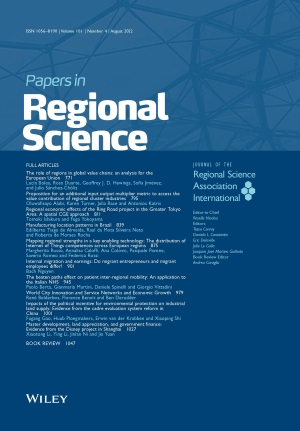


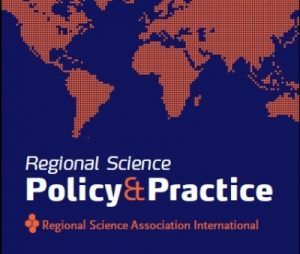
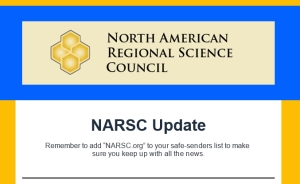

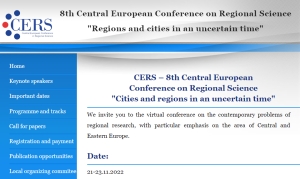






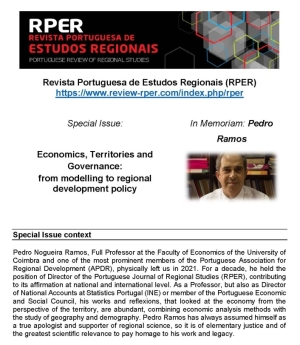
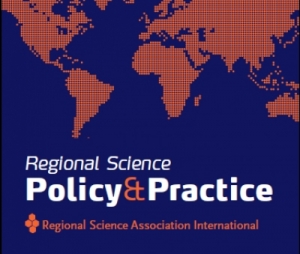
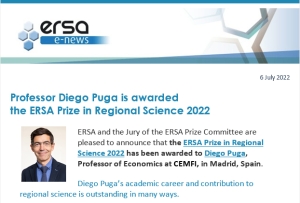

 ERSA and the Jury of the ERSA Prize Committee are pleased to announce that the
ERSA and the Jury of the ERSA Prize Committee are pleased to announce that the  The ERSA Prize in Regional Science 2022 will be presented on August 26th during the Closing Session of
The ERSA Prize in Regional Science 2022 will be presented on August 26th during the Closing Session of Mark your Agenda for August 26, 16:00-17.30 (CET Time)
Mark your Agenda for August 26, 16:00-17.30 (CET Time)